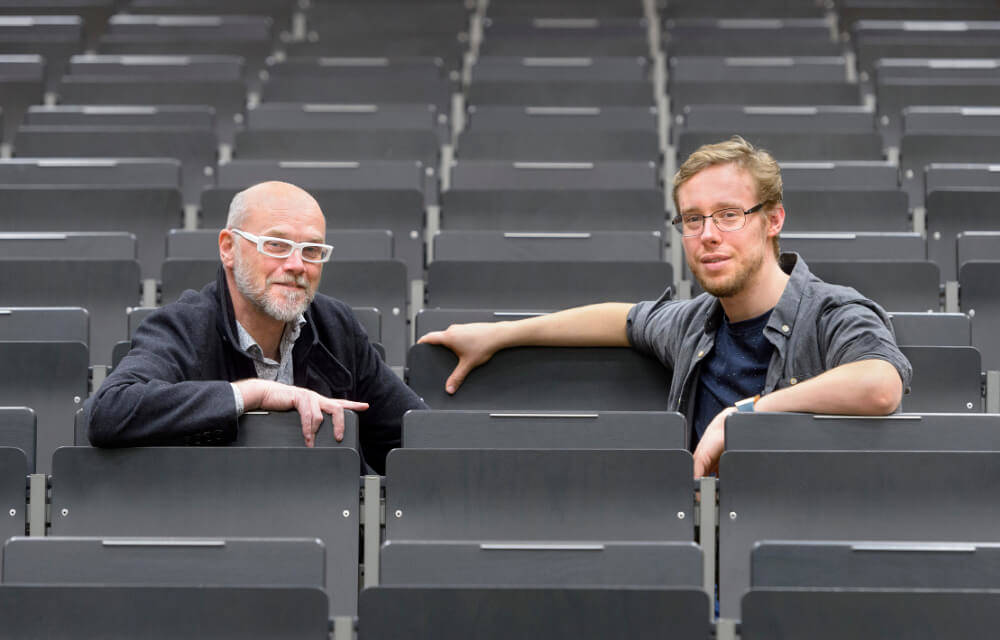How does artificial intelligence make decisions? Substantial funding for interdisciplinary research

Computer science professor Holger Hermanns with Kevin Baum, computer scientist and philosopher, in a lecture hall on the campus of Saarland University (February 2019) ©Iris Maurer
Many computer systems today use algorithms of Artificial Intelligence. But how do these systems make decisions? And how can their behavior be explained so that we can trust them? Researchers from computer science, philosophy, psychology and law are now addressing such questions in the project “Explainable Intelligent Systems (EIS)”. Over the next three years the Volkswagen Foundation is funding the research project of Saarland University and TU Dortmund with around 1.5 million euros.
The interdisciplinary research team addresses different facets of the question in what ways intelligent systems and their behaviors should be explainable to meet important societal desiderata. “Only if we understand why such systems make certain decisions can we trust them and understand whether they correspond to our social, moral and legal values,” says junior philosophy professor Lena Kästner from Saarland University, who leads the project. The results are expected to be a framework to guide future research and policy-making regarding intelligent systems.
Intelligent systems are already part of our everyday lives. These are machines or software that support humans in making decisions or decide for them altogether. “The scope of the decisions made by artificially intelligent systems varies greatly,” explains computer science professor Holger Hermanns. Some of these systems only suggest music or TV shows based on a user’s previous preferences, while others decide who gets a loan, who fills a vacant job position or which way a self-driving car goes. “In order for us to trust AI systems, their decisions have to be understandable and robust in various dimensions,” Hermanns continues.
Researchers at Saarland University have been addressing the ethical aspects of the digital revolution since 2014. Together with computer scientist and philosopher Kevin Baum and philosopher Sarah Sterz, Holger Hermanns developed the lecture “Ethics for Nerds”. It was offered for the first time in 2016 and was awarded the “Hochschulperle des Jahres 2019” by the “Stifterverband für die Deutsche Wissenschaft” (Donors’ Association for the Promotion of Sciences and Humanities in Germany).
“The lecture gave rise to the idea for a project that crosses the boundaries of several disciplines,” says Kevin Baum, who is doing a PhD on the ethics of collective action and machine ethics. “Through our lecture we quickly realized that explainability and understandability do seem important for a whole range of societal claims about artificial intelligence,” Baum explains. “But to what extent and why does this connection between understandability and societal claims actually exist? And can the methods that the field of explainable artificial intelligence is producing even fulfill this role? If not, then what can we learn from this? We say: there is a great need for research here, which requires expertise from a wide range of disciplines.”
This gave rise to an interdisciplinary project that complements other highly funded research projects at Saarland University, which also explore understandable and trustworthy software: Since February 2019, “Explainable Intelligent Systems” has been supported by a “Planning Grant” from the Volkswagen Foundation – this has now been transferred to a “Full Grant” which is funded with around 1.5 million euros. From Saarland University Junior Professor Lena Kästner and Professor Ulla Wessels from the Department of Philosophy, Professor Georg Borges from the Institute of Legal Informatics, psychologist Markus Langer PhD and Professor of Computer Science Holger Hermanns are involved. On the side of TU Dortmund, junior professor Eva Schmidt from the Department of Philosophy and Political Science participates in the project.
Additionally, numerous international collaborations take place as part of the project. In the fall of 2019, the Saarbrücken researchers already organized a major scientific conference with a public panel discussion at the Saarbrücken St. Johann City Hall. Together with partners from Cambridge, Delft and Stanford, a whole series of such events is now being organized.The project’s researchers are also networking locally and nationally. On the computer science side, for example, they cooperate closely with the transregional collaborative research center “Foundations of Perspicuous Software Systems (CPEC),” which is run in together with the TU Dresden and whose spokesperson is also computer science professor Holger Hermanns.
“Artificial intelligence now affects many areas of our daily lives and goes far beyond purely technical applications of computer science. The use of AI often involves complex questions that can only be answered in an interdisciplinary manner and in close cooperation between different scientific disciplines. This is precisely where this innovative and forward-looking research alliance comes in. I am convinced that the interdisciplinary campus of Saarland University offers the scientists involved in the project ideal conditions for this,” adds University President Manfred Schmitt.
Questions can be directed at:
Juniorprof. Dr. Lena Kästner
Philosophisches Institut
0681 302 2841
lena.kaestner(at)uni-saarland.de
Prof. Dr. Holger Hermanns
Dependable Systems and Software
Email: hermanns(at)cs.uni-saarland.de
Tel.: +49 (0)681 302 5630
Kevin Baum
Kevin.baum(at)uni-saarland.de
Tel. +49 (0)681 302-2351
More Information:
https://explainable-intelligent.systems/
Press release of the Volkswagen-Foundation: https://idw-online.de/de/news760051
Background Saarland Informatics Campus:
800 scientists and about 2000 students from more than 80 nations make the Saarland Informatics Campus (SIC) one of the leading locations for computer science in Germany and Europe. Five world-renowned research institutes, namely the German Research Center for Artificial Intelligence (DFKI), the Max Planck Institute for Computer Science, the Max Planck Institute for Software Systems, the Center for Bioinformatics and the Cluster for “Multimodal Computing and Interaction” as well as Saarland University with three departments and 21 degree programs cover the entire spectrum of computer science.
Editor:
Philipp Zapf-Schramm
Competence Center Computer Science
Saarland Informatics Campus
Phone: +49 681 302-70741
E-Mail: pzapf@mmci.uni-saarland.de
